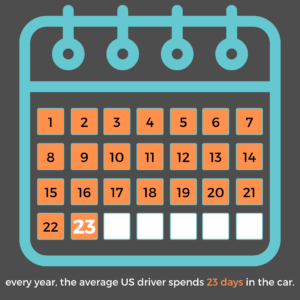How Much Time Do You Spend in Your Car?
Not only do cars take a lot of our money, but they also take a lot of our time. The average person spends between 18 and 23 days per year sitting in a car. Twenty-three days is almost a month long. Think of everything else we could be doing with that time.

And a lot of that time is spent traveling to local places, like work, school, the grocery store, and the gym. The average person spends between 70-90 minutes per day in the car, with 54 of those minutes used on their roundtrip work commute.
By reducing your travel time, you can save on gas, maintenance, and repair. You might even be able to not need a car at all, which could save the entire $9,000 per year that the average driver spends to own one. Plus, you can now spend that commute time on things you enjoy.
How Can You Save Time and Money with Transportation?
Live Closer
By living closer to places you frequent, you reduce your travel distance, time, and expenses. In general, it’s easiest to reduce your daily travel if you live in a city because stores, restaurants, and work places are closer together. You might pay higher rent by living in a city compared to suburbs or rural areas, but this higher rent can be balanced or outweighed by the money and time savings related to transportation
If you live close enough to work, you might be able to get rid of your car altogether and just walk or bike to work. Walking and biking have great health benefits, so this could save you in future healthcare costs as well.
Use Public Transportation
Another great option for reducing your car expenses by using it less is to take public transportation. The average household can save $10,000 per year by using public transportation instead of cars. In Boston, San Francisco, and New York, these savings can be as high as $12-15,000 per year.
Some people hesitate to take public transportation because there’s a chance it could take more time than it would to drive a car. But public transportation modes like metros and light rail have the benefits of never encountering traffic jams. You can also save a lot of time by not needing to find parking. You’re also able to use your time in more productive or relaxing ways if you’re sitting in public transportation instead of driving a car. Your travel time can be used to read or check emails instead of concentrating on the road.
Public transportation is also 10 times safer than driving a car. You’re 90% less likely to get in an accident if you’re using public transportation instead of a car, so that will save you on medical expenses as well.
To take advantage of all the financial savings that public transportation provides, be sure to look for ticket deals that are usually offered for students, children, military, disabled, or low-income populations. You should also look into purchasing monthly passes which are cheaper per ride.
While public transportation can seem scary in COVID times, cities have taken great measures to ensure cleanliness of public transport. Some places have even made public transportation discounted or free to help during these difficult times.
Use Bikes, Scooters, and Rideshare Apps
Sometimes public transportation stops aren’t right next to your home or work. This means you’ll have to walk or find some other transportation to cover that distance. You can bring your own bike with you when you take public transportation, or you can use shared e-bikes and scooters. These are becoming super popular in cities. In 2018, 84 million trips were taken on e-bikes and scooters.
Another option for getting yourself to and from a public transportation stop is to use a rideshare app like uber or lyft. In many places across the US, it’s cheaper to use rideshare apps than it is to own a car.
Disclaimer: Please consult with a professional before making any upgrades or changes to your transportation mode. Any and all upgrades should maintain proper health and safety for yourself and your community. It All Adds Up and its affiliates are not responsible for any transportation accidents or personal injuries that should occur from following any suggestions from It All Adds Up.
HAVE QUESTIONS?
Do you have a certain topic that you would like us to talk about?
READY TO SAVE?
Check out our latest episodes for tips and tricks to save you money!
SUBSCRIBE
We send out a weekly email to our listeners that reviews that week’s episode! To join our mailing list, enter your email in the box below and hit “Subscribe.” Make sure to add [email protected] to your contact list.
ABOUT US
Get to know more about us and the team behind our podcast!
